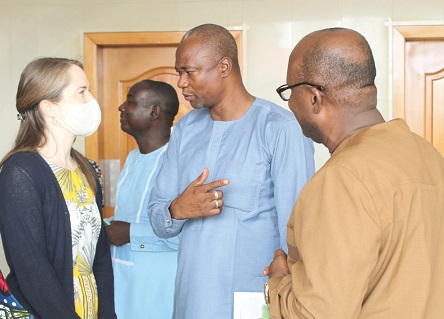The Directorate of Agricultural Extension Services (DAES) has launched an e-Extension Strategy Plan to provide agricultural value chain actors with transformational extension services.
These services, which are driven by information and communications technology (ICT), are meant to be effective, efficient, inclusive, sustainable, demand-driven.
The e-Extension service will be decentralised but coordinated at the national level, with the active involvement of the private sector.
At the launch of the strategy in Accra last Thursday, the Director of DAES, Paul Siameh, said the project started in 2020 but needed adjustment and modifications due to the COVID-19 pandemic.
Before project
Mr Siameh said the provision of the agricultural extension and rural advisory services had suffered loss and decline as a result of limited extension officers.
He said as of 2017 there were 1,586 agricultural extension agents (AEA) serving 3.37 million farmers.
That, he said, imposed a heavy burden on the available staff and the implication on the effectiveness and efficiency of extension delivery.
However, the Ministry of Food and Agriculture (MoFA) sought approval to recruit more recently.
"This action by the Minister greatly improved and increased the extension agents to 4,286 and subsequently brought AEA: Farmer ratio to 1:706 in 2019,” Mr Siameh said.
Unfortunately, he added, the improved AEA: Farmer ratio from the recruitment of 2,700 still fell short of the optimum ratio of 1:500.
Mr Siameh disclosed that due to that MoFA, through the DAES and support from Global Affairs Canada under the Modernising Agriculture in Ghana Project, commissioned Farm Radio International (FRI) to develop a well-researched strategy and plan to enhance Digital Agricultural Advisory Services.
This was to be part of the National Agricultural Extension System to effectively serve men and women farmers as well as other agricultural value chain actors.
He said the Plan was developed after a two-year review of case studies, scanning and assessing ICT tools being used in Ghana, Uganda, Ethiopia and Malawi and assessing the capacity of extension officers.
Mr Siameh said staff were also trained to produce the Green Leaf Magazine across 16 radio stations, while Digital Advisory Focal Persons were selected for each region.
Canadian support
The Agricultural Sector Lead at the Canadian High Commission to Ghana, Candace Holt, commended MoFA, FRI and advising consultants for thier collaboration on the development strategy.
She said the implementation of the strategy plan was an important practice to ensure sustainability and ensure that staff were aware of the strategy and understood it to ensure continued attention to develop and maintain e-extension services.
"From a Canadian perspective, it is extremely important for us to see agriculture extension services that are accessible and geared towards supporting women and men farmers alike,” Ms Holt said.
e-Extension plan
The Consultant for DAES and FRI, Doctor Pascal Attengdem, who gave a presentation on the outline of the e-Extension Strategy and Plan, said the outline was in five phases.
He explained that the strategy was transformational because it included a wide range of ICT and digital tools and devices such as radio, telephony, video, television, mobile applications and devices, social media and emerging technologies which were consistent with the guiding principles of the country's agricultural extension policy.
"We have been challenged with the need to move away from the usual foot soldier type of extension, farmer to farmer, extension agent to farmer, and visiting homes to talk to people because it is now evident that ICT or electronic gadgets can do the same things and more effectively," Dr Attengdem explained.
He called on stakeholders, especially the universities, to introduce courses educating agriculturalists on e-Extension in order not to lose out on the project implementation.

